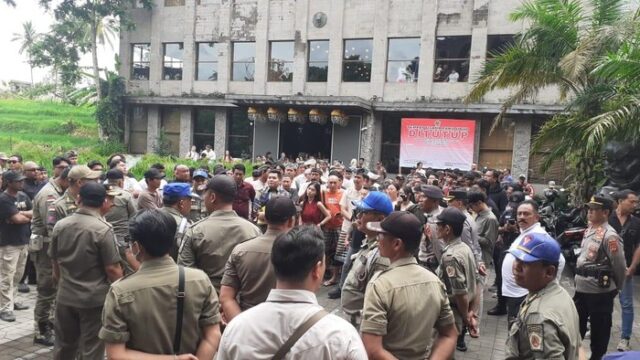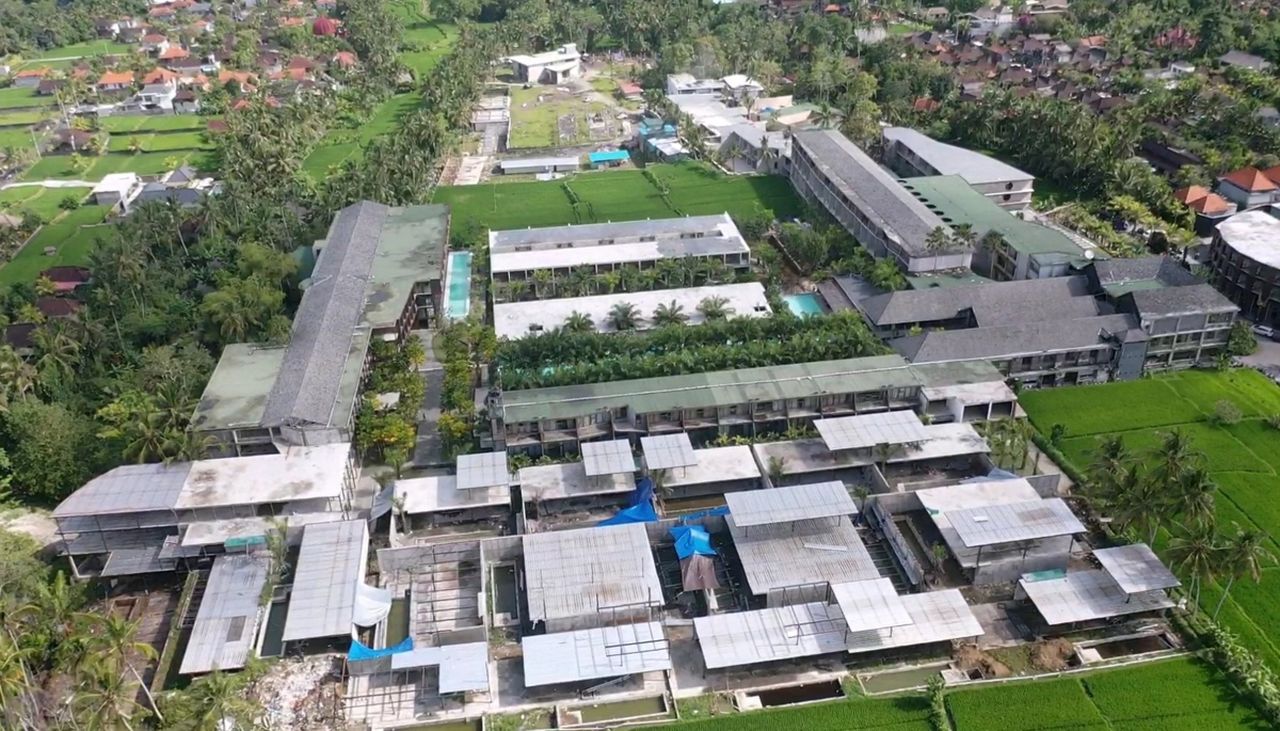As reported by Beritabali.com, a Director of PT PARQ – an accommodation and entertainment complex – widely referred to in Bali media as the “Russian Village” in Ubud, has been charged by the Bali Police with criminal misuse of 4.5 hectares of land occupied by controversial PARQ Project.
The Police have also charged a Russian national AF (53) identified as a “boss” at PARQ for illegally converting the use of protected rice fields. The Police list AF as a Director of PT Parq Ubud Partners, a Director of PT Tomorrow Land Development, and also a Director of PT Alfa Management Bali.
The Chief of the Bali Provincial Police, Inspector General Daniel Adityajaya, defended the arrests because of the rapid diminishment of productive agricultural lands and the loss of 1,445 hectares of rice fields to residential and tourism projects. On Friday, 24 January 2025, Chief Adityajaya added: “The Case File has been handed to prosecutors, and we now await for the judicial process to proceed.”

The Prosecution File is based on a 25 November 2025 Police Report (Laporan Polisi : LP/A/42/XI/2024/SPKT.Ditreskrimsus/ Polda Bali) regarding the PARQ Project situated at Jalan Sri Wedari no. 24, Ubud, Gianyar, Bali.
The criminal charges allege that the defendants illegally built villas, a spa center, and livestock farms on protected rice fields and sustainable agricultural food land (LP2B) that form part of the food crop sub-zone (P1).
The evidence file compiled by the Police includes photocopies of land certificates, land lease deeds, and copies of Regulations and Decrees from the Ministry of Agrarian Affairs, Spatial Planning Agency, and the Gianyar Regency Administration – all formally legalized for eventual use in Court Proceedings.

The Indictments
The two men have been indicted for violating Law Number 22 of 2019 on Sustainable Agricultural Cultivation Systems and Law Number 41 of 2009 on Sustainable Food Crop Land Protection. AF has been in police custody since 17 January 2025.
“Will the Courts be able to order the demolishment of illegal buildings erected on protected agricultural lands? What funds are available for demolishment and land restoration if this occurs? The sad alternative is that possible stains and blemishments on the ancient lands of Bali will become a permanent part of the Island’s landscape.“
“The suspect was charged with Article 109 in conjunction with Article 19 paragraph (1) of Law of the Republic of Indonesia Number 22 of 2019 and Article 72 in conjunction with Article 44 paragraph (1) of Law of the Republic of Indonesia Number 41 of 2009 with a maximum prison sentence of 5 years and a maximum fine of IDR 1,000,000,000,” said Bali Police Chief, Inspector General Daniel Adityajaya.
Article 109, in conjunction with Article 19 paragraph (1) of Law Number 22 of 2019 concerning the Sustainable Agricultural Cultivation System, which has been amended in Law of the Republic of Indonesia Number 6 of 2023 concerning the Stipulation of Government Regulation instead of Law Number 2 of 2022 concerning Job Creation into Law.
Article 109 states that anyone who converts land designated as Agricultural Cultivation Lands, as referred to in Article 19 paragraph (1), shall be subject to a maximum term of imprisonment of 5 years and a maximum fine of Rp. 1,000,000,000 (one billion rupiahs).
Article 19 (1) stipulates that everyone is prohibited from converting land designated as agricultural cultivation land. Also, Article 72, in conjunction with Article 44 paragraph (1) of Law of the Republic of Indonesia Number 41 of 2009 concerning the Protection of Sustainable Food Crop Land, has been amended in Law of the Republic of Indonesia Number 6 of 2023 concerning the stipulation of government regulations instead of Law Number 2 of 2022 concerning Job Creation into law.
Article 72 states that individuals who convert sustainable food croplands, as referred to in Article 44 paragraph (1), shall be subject to a maximum imprisonment of 5 years and a maximum fine of IDR 1,000,000,000 (one billion Rupiahs). Article 44 (1) states that land designated as sustainable food agricultural land is protected, and its conversion is prohibited.
Land Restoration Remains an Outstanding Question
Beyond any prison terms and fines that may be imposed on those criminally charged in the PARQ Ubud case, it remains unclear what remedies the legal system will provide beyond punishments and penalties to those guilty of breaking the law.
Will the Courts be able to order the demolishment of illegal buildings erected on protected agricultural lands? What funds are available for demolishment and land restoration if this occurs? The sad alternative is that possible stains and blemishments on the ancient lands of Bali will become a permanent part of the Island’s landscape.
Chronology of Arrest
Inspector General of Police Adityajaya credited the arrest of the two men to an investigation by the Bali Police Special Criminal Investigation Directorate that started on Thursday, October 24, 2024.
From the investigation, it was determined that PARQ committed the criminal act of changing the function of agriculturally protected areas (LSD). Investigating officers sought legal clarification from AF, as a Director of PARQ Ubud, staff and employees, and a Balinese land owner with the initials IGNES.
The evidence consists of several important documents, including photocopies of land certificates, land lease deeds, Regulations and Decrees from the Ministry of Agrarian Affairs and Spatial Planning and the Gianyar Regency Government that have been legalized related to the case.
The case was broken open because an investigation by the Bali Police Special Criminal Investigation Directorate started on Thursday, October 24, 2024.
From the investigation, it was determined that there was a criminal act committed in changing the function of LSD. Police Officers then obtained further evidentiary clarification from AF as a Director of PARQ Ubud, staff and employees, and a land owner with the initials IGNES.
Based on the results of the interrogation of IGNES, 34 Certificates of Ownership (SHMs) were uncovered used for the land required for the PARQ business. The 34 SHMs were presented to the Head of the Public Works and Spatial Planning Service (PUPR) of Gianyar Regency to describe the spatial pattern of PARQ Ubud.
“From the results of the PARQ Ubud spatial pattern, it was found that the PARQ development is in 3 zones, namely zone P1 (LSD and LP2B), plantation zone (P3) and tourism zone,” said the Police Chief. A field check confirmed buildings determined that buildings are standing in each of the three zones. The buildings standing in P1 (LSD and LP2B) are exclusively for traditional agriculture and are, as a result, strictly forbidden to the erection of permanent structures under provincial zoning laws
Related Links
Gianyar Closes PARQ Complex in Ubud, Bali
PARQ Ubud Closed by Bali Authorities
Bali Deports 3 Russians for Prostitution
Russian Envoy Defends Tourists’ Reputation
Russian Flights Inbound for Bali?
Moscow to Open a Consulate General in Bali
Russian Causes a Ruckus in Bali
The Russians are Coming to Bali
Russian Posing as a Cop Arrested in Bali
Russian Envoy Objects to VoA Revocation
Russian Facing 7 Years for Motorcycle Theft
Bali Deport 5 Moldavians & 1 Russian
Stay Informed on Bali Tourism-Related News: Subscribe to Bali Update






